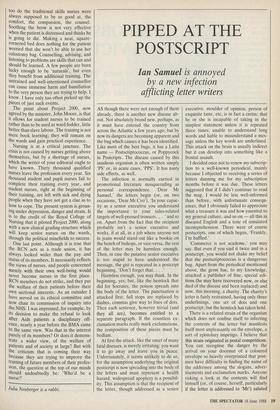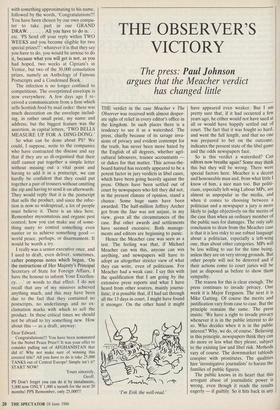PIPPED AT THE POSTSCRIPT
Ian Samuel is annoyed
by a new infection afflicting letter writers
AS though there were not enough of them already, there is another new disease ab- out. Not absolutely brand new, perhaps, as it must have entered the country from across the Atlantic a few years ago; but by now its dangers are becoming apparent and the bug which causes it has been identified. Like most of the best bugs, it has a Latin name — Postscriptococcus, or Poppycock in Postcripts. The disease caused by this insidious organism is often written simply 'PS' or, in acute cases, 'PPS'. It has nasty side effects, as well.
The infection is normally carried in promotional literature masquerading as personal correspondence. 'Dear Mr Samuel,' the letters begin (or, on two occasions, 'Dear Mr Cvo'), 'In your capac- ity as a senior executive you understand the importance to your sales-related targets of well-pressed trousers. . . ' and so on. Apart from the fact that .the recipient probably isn't a senior executive and works, if at all, in a job where anyone not in jeans would stand out like a bookie on the bench of bishops, or vice-versa, the rest of the letter may be harmless enough. Then, in case the putative senior executive is too stupid to have understood the message, the gist is repeated in a postcript beginning, 'Don't forget that. . .
Harmless enough, you may think. In the beginning, yes; but, like the hemlock that did for Socrates, the poison spreads into the body of the letter. The punctuation is attacked first: full stops are replaced by dashes, commas give way to lines of dots. Then each sentence, however trivial (and they all are), becomes entitled to a separate paragraph. If the countless ex- clamation marks really mark exclamations, the composition of these pieces must be bedlam.
At first the attack, like the onset of many fatal diseases, is merely irritating; you want it to go away and leave you in peace. Unfortunately, it seems unlikely to do so, for the assumption underlying the original postscript is now spreading into the body of the letters and must represent a health hazard: widespread apoplexy is a possibil- ity. This assumption is that the recipient of the letter, though addressed as a senior executive, moulder of opinion, person of exquisite taste, etc, is in fact a cretin; that he or she is incapable of taking in the simplest statement unless it is repeated three times; unable to understand long words and liable to misunderstand a mes- sage unless the key words are underlined. This attack on the brain is usually indirect but it can develop into something like a frontal assault.
I decided once not to renew my subscrip- tion to a well-known periodical, mainly because I objected to receiving a series of letters dunning me for my subscription months before it was due. These letters suggested that if I didn't continue to read the mag, I would be less well-informed than before, with unfortunate consequ- ences, that I obviously failed to appreciate what a treasure it was and how essential to my general culture, and so on — all this in diseased English and a tone of simulated incomprehension. There were of course postscripts, one of which began, 'Frankly, I'm baffled.'
'Commerce is not academe,' you may say. But even if you said it twice and in a postscript, you would not shake my belief that the postscriptococcus is a dangerous bug. Apart from the periodical mentioned above, the germ has, to my knowledge, attacked a publisher of fine, special edi- tions (he may have recovered now, or else died of the disease and been replaced) and now, this morning, a charity. The charity's letter is fairly restrained, having only three underlinings, one set of dots and one postscript; but the hemlock has taken hold.
There is a related strain of the organism which does not confine itself to infecting the contents of the letter but manifests itself most unpleasantly on the envelope, a sort of epistolary impetigo. I believe that this strain originated in postal competitions. You can recognise the danger by the arrival on your doormat of a coloured envelope so heavily overprinted that post- men have difficulty in finding the name of the addressee among the slogans, adver- tisements and exclamation marks. Anyone risking a look at the contents will find himself (or, of course, herself, particularly if the letter is addressed to 'Mr') saluted with something approximating to his name, followed by the words, 'Congratulations!!! You have been chosen by our own compu- ter to take part in our GRAND DRAW All you have to do is. . . etc. 'PS Send off your reply within TWO WEEKS and you become eligible for two special prizes!!': whatever it is that they say you have to do, you would be unwise to do it, because what you will get is not, as you had hoped, two weeks at Cipriani's in Venice, but two of the 30,000 consolation prizes, namely an Anthology of Famous Postscripts and a Condensed Book.
The infection is no longer confined to competitions. The overprinted envelope is now everywhere. A few days ago I re- ceived a communication from a firm which sells Scottish food by mail order: there was much decoration on the envelope includ- ing, in rather small print, my name and address; but the biggest feature was the assertion, in capital letters, 'TWO BELLS MEASURE UP FOR A DING-DONG.'
So what can be done about PS? We could, I suppose, write to the companies who have contracted the disease and say that if they are so ill-organised that their staff cannot put together a simple letter without missing out a vital point and having to add it in a postscript, we can hardly be confident that they could put together a pair of trousers without omitting the zip and having to send it on afterwards. They would reply that it is the postscript that sells the product, and since the infec- tion is now so widespread, a lot of people must believe it. There is an idea here. Remember myxomatosis and organic pest control; how you can make use of some- thing nasty to control something even nastier or to achieve something good world peace, perhaps, or disarmament. It would be worth a try.
I really was a senior executive once, and I used to draft, even deliver, sometimes, rather pompous notes which began, 'On the instructions of Her Majesty's Principal Secretary of State for Foreign Affairs, I have the honour to inform Your Excellen- cy. . .' or words to that effect. I do not recall that any of my missives achieved anything much, and this may have been due to the fact that they contained no postscripts, no underlinings and no ex- clamation marks with which to sell the product. In these critical times we should not be afraid to try something new. How about this — as a draft, anyway:
Dear Edward, Congratulations!!! You have been nominated for the Nobel Peace Prize!! It was your offer to consider pulling out of AFGHANISTAN that did it! Why not make sure of winning this coveted title? All you have to do is take 25,000 TANKS out of Central Europe! Simple isn't it? START NOW!
Yours sincerely, Geoff. PS Don't forget you can do it by instalments, 5,000 now ONLY 1,000 a month for the next 20 months! PPS Remember, only 25,000!!!



















































 Previous page
Previous page